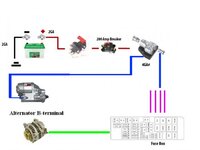freakingbori617
15+ Year Contributor
- 47
- 0
- Apr 8, 2008
-
BOSTON,
Massachusetts
So Ive been in the process of my relocations and finally finished up. But im having a problem with low voltage while cranking. Voltage at the started drops to 6-7v, while cranking. Here is a diagram I made to show how the wires are set up. The purple wire are the four thick wires from the fusebox that are paired directly to the battery post on a normal car.

















